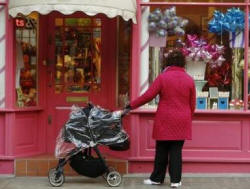|
 Euro
zone inflation slows in September, weakens euro versus dollar Euro
zone inflation slows in September, weakens euro versus dollar
 Send a link to a friend
Send a link to a friend
[September 30, 2014]
By Jan Strupczewski
BRUSSELS (Reuters) - Euro zone inflation
slowed further in September on falling prices of unprocessed food and
energy, a first estimate showed on Tuesday, sending the euro lower
against the dollar on expectations of further European Central Bank
policy easing.
|
|
 Eurostat said consumer prices in the 18 countries sharing the euro
rose 0.3 percent year-on-year, slowing from 0.4 percent year-on-year
increases in August and July. The September was in line with market
expectations, according to polling data. Eurostat said consumer prices in the 18 countries sharing the euro
rose 0.3 percent year-on-year, slowing from 0.4 percent year-on-year
increases in August and July. The September was in line with market
expectations, according to polling data.
The ECB wants to keep headline inflation below, but close to, 2
percent over the medium term. The persistently low rate underscores
the difficulty of hitting that target in a stagnating euro zone
economy.
By 0625 ET, the euro had fallen against the dollar to 1.2609 from
1.2662 before the release. The FTSE Eurofirst 300 share index of
leading companies was up 0.56 percent at 1,378.81.
"With actual output below potential and weak wage growth in many
euro zone countries, inflation will remain subdued," said Tomas
Holinka, economist at Moody’s Analytics.
 "The euro area economy stalled in the second quarter and the
recovery prospects are fading. With tougher sanctions against
Russia, risks are weighted to the downside. The euro zone’s weaker
than expected performance fuels uncertainty about economic recovery
and fears about the threat of deflation," he said.
Unprocessed food prices fell 0.9 percent year-on-year in September
and energy was 2.4 percent cheaper.
What the European Central Bank calls core inflation - a measure
stripping out these two volatile components - was 0.7 percent
year-on-year, slowing down from 0.9 percent in August.
To accelerate price growth, the ECB has cut the cost of borrowing to
almost zero and pledged further cheap loans to banks and to buy
repackaged debt. ECB President Mario Draghi has emphasized that it
could do even more.
But going for full-blown quantitative easing, by adding government
bonds to the ECB's shopping list, would be politically difficult
because of stiff opposition in Germany.
[to top of second column] |

Draghi is expected to give further details of ECB plans to buy
reparcelled debt, known as asset-backed securities, when the bank’s
governing council meets in Naples on Thursday. Investors do not
expect new policy decisions yet, after the bank cut all three of its
main interest rates in early September.
Draghi has, in the meantime, sought to put the ball back in the
court of governments, saying that the central bank cannot
single-handedly turn around the bloc’s economy, and countries need
to make reforms.
The ECB's job may be made easier by a weakening euro, which has
broken below its 2013 lows and is down almost 9 percent from the
peak it hit against the dollar in May.
(Additional reporting by John O'Donnell in Frankfurt; Editing by
Alastair Macdonald and Mark Trevelyan)
[© 2014 Thomson Reuters. All rights
reserved.] Copyright 2014 Reuters. All rights reserved. This material may not be published,
broadcast, rewritten or redistributed.

 |